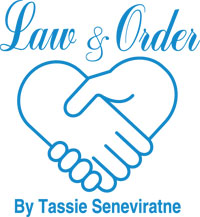Sunday Times 2
Law and order gone topsy-turvy
View(s):Laws of any country are with a view to ensure human rights equitably. “Rule of law’ and ‘good governance’ boil down to the same thing.
In Sri Lanka, law and order has gone topsy-turvy, meaning law and order does not impart any meaning or purpose in its exercise, nor offer any direction in its endeavour. This has been so for quite some years. This fact has been discussed over and over again. The English poet T.S. Elliott said the end of all exploration is to arrive at the beginning. In the beginning were the people. Others came later. But no such end is seen, even prospectively; the people have to wait.
 The people will lie thus forlorn and helpless. For the people are abandoned by the systems instituted. The relevant systems are of governance, of the organs of government, of Criminal Justice System (CJS). But the law as it prevails, is not of the people; it is to suit law professionals. Order for that matter is again not that of the people. All this is, however, in the control of a body of ruling elite at the expense of the people. Their consequent effect on the people needs to be identified.
The people will lie thus forlorn and helpless. For the people are abandoned by the systems instituted. The relevant systems are of governance, of the organs of government, of Criminal Justice System (CJS). But the law as it prevails, is not of the people; it is to suit law professionals. Order for that matter is again not that of the people. All this is, however, in the control of a body of ruling elite at the expense of the people. Their consequent effect on the people needs to be identified.
Thus, any aspiration of the people to a sense of community solidarity as against the establishment, is denied to the people. Loss of esteem of the victim/witness (VWs) of the people in the CJS system is evident. And, thus, VWs stand even drained of their sense of worth. Witnesses in courts are harassed, embarrassed, insulted, humiliated and intimidated with unsubstantiated allegations. This follows them to the community. The community in turn shuns them and the courts — a negative community feature well known. Community solidarity of the people is then but a distant cry. It is idle, therefore, to even talk of a sense of unity of the people by way of law and order. Instead discord prevails much in society: and strife brings lucre to those who govern.
Loss of self-esteem and even the civic standing of the people undermine law and order. Exploitation of the deprived sets in. Corruption is the all-inclusive term to add and cover over this area. And in respect of corruption, the experience of the people has been of failure to prevent corruption, of promoting corruption and recently of a takeover by corporate power and interests. All this is at the expense of the people. Their exploitation is now unabashed. Deprivation and exploitation are for lucre.
To avoid running in circles — the destination being the people; the explorative steps taken, merit reiteration. The law touching law and order is not for the people. The law is made by law professionals to advance their own interests. A few exceptions were made to make for a law of direct benefit to the people. They were resisted by courts on grounds they were a usurpation of judicial power, as though that judicial power is not that of the people! This survey of the law makes clear, the end is yet not with the people.
Likewise, has been the result of the CJS delving into process of the law. That search was not a process to serve the people; that process serves instead all the others in the CJS. It cannot even be said that the means deployed by the CJS are due process. The dysfunction in the CJS itself does not make for due process. The maladministration of the law is undue process. This is surely at the expense of the people. But there is lucre for those in the CJS system.
Order is all the more not for the people. The law and process do not arrive at the critical point of order for the people. What then of community solidarity of the people, when the law itself gravely undermines the people? Reference here is to corruption, of which it was noted earlier that there was failure to prevent corruption, that there is promotion of corruption and, to crown it all, the forceful seizure of control by corporate power. All this too is at the expense of the people relegated into irrelevance, while there is lucre for others.
The independence of the CID has been called into question in this melee and, worse still, Executive Ministers have direct access to the CID. In the Police outside the CID, there are other divisions which are competent as well; only that they are not malleable – so far. The IGP has been given a free hand to look the other way through all this.
It is needless to emphasise that judges should protect witnesses giving evidence before them, in the name of justice. In the early 1960s, I was giving evidence for the prosecution before the Chief Magistrate Colombo, (CM) D.Q.M. Sirimanne. In cross-examination, defence counsel started pummeling me with unsubstantiated and suggestive allegations. Although my answers were in the negative, the allegations humiliated me as it affected my self-esteem. The CM came to my rescue, and told defence counsel, “Mr. Gunasekere, you can file charges on these allegations, and I’ll hear you then”. The defence counsel sat down deflated.
All judges should follow suit if justice is to prevail.
(The writer is a Retired Senior Superintendent of Police. He can be contacted at seneviratnetz@gmail.com – TP 077 44 751 44.)

